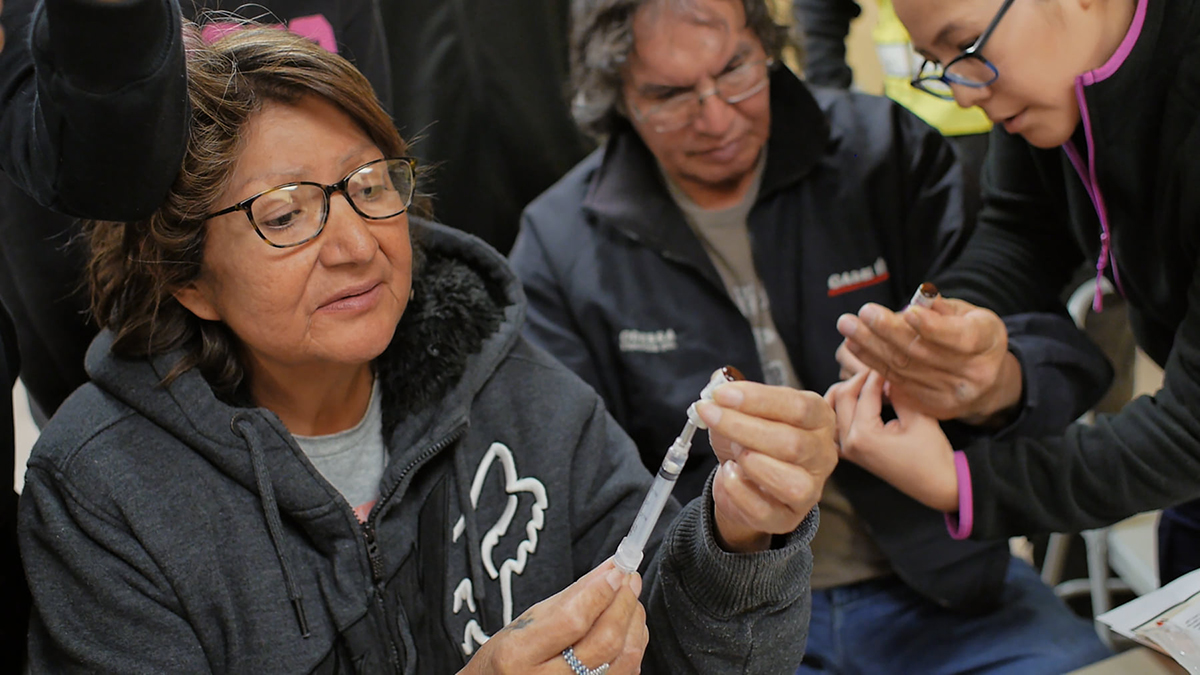Under the Radar: Elle-Máijá Tailfeathers Seeks Empathy with “Kímmapiiyipitssini”
When Elle-Máijá Tailfeathers, an award-winning writer, director, and actress, was developing her most recent feature documentary about substance-use disorders and harm reduction, she wasn’t sure whether she should also be the film’s narrator. It’s a dilemma many documentary filmmakers...

When Elle-Máijá Tailfeathers, an award-winning writer, director, and actress, was developing her most recent feature documentary about substance-use disorders and harm reduction, she wasn’t sure whether she should also be the film’s narrator. It’s a dilemma many documentary filmmakers find themselves working through, as they determine the proper balance of including their voice – both literally and figuratively – while still providing space for their subjects to drive the story. Being close to the topic seemed to require Tailfeathers to analyze her place in both the documentary and the extremely complex social issue at hand. As she told the Mulligan Stew Podcast, “[I] felt very conflicted about how I fit within the story – but then realized that it was important for me to go on this journey with the audience.”
The result of including more of her on-camera presence in “Kímmapiiyipitssini: The Meaning of Empathy” is an intimate, immersive view of a critical opioid epidemic that continues to sweep across North America at an alarming rate. The documentary took Tailfeathers around five years to fully execute. Inspired by her mother’s work “on the frontlines” as a doctor, advocate, and activist, Tailfeathers was committed to telling the stories of those impacted by addiction in her community of Kainai. As a member of the Kainai First Nation and Norway’s Sámi, Tailfeathers was in a unique position to earn the trust of the film’s subjects.
“I was so overwhelmed with the number of people who wanted to share their stories within the community,” Tailfeathers told the National Film Board of Canada. “And I was also just so touched by the fact that people trusted me with their stories.” She credited the multitude of enthusiastic interview subjects with wanting to help others who may be struggling with addiction.
“‘Kímmapiiyipitssini’ is a portrait of my community’s response to the opioid crisis,” Tailfeathers explained to the University of British Columbia. “My mother is a physician on the reserve, a medical doctor, and I heard from her time and time again about what she was witnessing on the frontlines of the crisis. I was also witnessing the grief and loss within our community, and hearing about all of the incredible community mobilization that was happening.”
Tailfeathers wasn’t satisfied with how the media portrayed these efforts. “It was often being framed through this lens of tragedy and grief and sorrow,” she continued to UBC. “There wasn’t enough coverage of the hard work that was happening. This film came out of the urgency to document what was happening in the community and provide the outside world with the opportunity to witness that work.”
As Tailfeathers detailed to Women and Hollywood right before the film’s premiere at Hot Docs 2021, “Kímmapiiyipitssini: The Meaning of Empathy” includes frontline workers like her mother, plus individuals living with substance-use disorders and those in recovery. She interviewed roughly 50 different members of her nation, of which there are roughly 14,000 members total.
“As a filmmaker and a community member, I felt an urgency and a responsibility to document these radical changes and also honor the lives of those lost to this crisis,” Tailfeathers explained. “Kímmapiiyipitssini — which means giving kindness to each other — is a Blackfoot teaching that reminds us that practicing empathy and compassion is how we survive as a people. It is how our ancestors survived genocide, and it is how we, as a community, will survive this crisis. Kímmapiiyipitssini is our harm reduction.”
Tailfeathers had witnessed the effects of substance-use disorder on her family, but she still initially knew very little about harm reduction. Through making this documentary, she learned about how lives can be saved by harm reduction methods. The film extensively explores these methods as life-saving alternatives to simply letting individuals die slow, painful deaths.
She also believes that Indigenous history must play an important role in the contemporary conversation, as well as any policies designed to address the crisis. As she mentioned to the Mulligan Stew Podcast, “We can’t talk about Indigenous people and substance-use disorder without talking about historical trauma and the ongoing trauma that Indigenous people are facing through systemic inequity, like poverty, lack of access to clean drinking water in many cases, lack of access to safe, supportive, stable housing.” Tailfeathers is emphatic that this discussion is incomplete without examining how colonialism has contributed to the modern-day health of Indigenous communities.
After the documentary completed production, Tailfeathers told the National Film Board of Canada that a detox or safe-withdrawal site featured in the film received long-term funding and also expanded its care options, particularly as it pertains to providing safe, stable housing. It’s not often that social change happens so quickly, especially given the political quagmire that harm reduction has become among ideologues.
Promoting “Kímmapiiyipitssini” has been just as much of a family affair as its production. Tailfeathers has enjoyed working closely with her mother, attending Q&As and screenings of the film together.
Though Tailfeathers has won numerous awards and earned widespread critical recognition for her work on “Kímmapiiyipitssini,” and while the film has screened globally, it hasn’t yet been distributed in the United States. Like their Canadian counterparts, American healthcare providers, activists, and policymakers are also seeing the long-term, dangerous effects of substance-use disorders. Fentanyl has decimated whole communities. American leaders have yet to find a general consensus on the efficacy of harm reduction, let alone how to govern, fund, and sustain such programs at the state and federal level.
It stands to reason that Tailfeather’s exploration of substance-use disorder would benefit those who also know little about harm reduction, but who wish to treat the opioid epidemic with the patience, understanding, and empathy that is so needed on the road to recovery.
“Empathy, in particular, is a means for grounding ourselves in hope and love,” Tailfeathers explained to UBC as she described her community’s spiritual approach to dealing with pain and adversity. “It’s easy to get trapped in a sense of loss and grief. In rooting this work in empathy, it grounds it in a sense of hope, and love, and determination rather than defeat.”
“Kímmapiiyipitssini: The Meaning of Empathy” was selected as the Best Canadian Documentary by the Vancouver Film Critics Circle in March, and won the Ted Rogers Best Feature Length Documentary prize at the Canadian Screen Awards in April. It is available to stream on the National Film Board of Canada’s website with a CAMPUS subscription. More updates can be found on Facebook.
Check out Tailfeathers’ website for more information about “Kímmapiiyipitssini” and her other work.
Under the Radar offers a chance for us to highlight works by and/or about women that haven’t received big releases or significant coverage in the press, but are wholly worthy of attention.

 JimMin
JimMin 
































